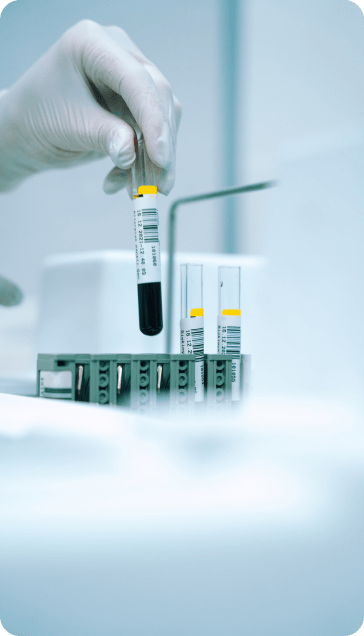
Al Borg Diagnostics
What is genetic testing?
Some genetic diseases, such as Huntington’s disease, can occur due to one or more gene mutations. However, other genetic disorders can result from genetic changes caused by environmental factors. Read on to learn more about the question, “What is genetic testing?”: (1)
What is genetic testing?
Genetic testing is a medical test that detects changes in genes, proteins, and chromosomes. This analysis helps confirm or exclude the presence of genetic diseases and determine the chances of developing them. The examination involves searching for the following changes: (2)
- Gene changes: The study of DNA sequencing is conducted to identify mutations and genetic variations that cause or increase the risk of genetic diseases.
- Chromosomal changes: Complete chromosomes or long segments of DNA are analyzed to determine significant genetic changes, such as extra copies of chromosomes, which are associated with genetic conditions and disorders.
- Protein changes: The quantity and activity level of proteins or enzymes are studied.
Why is genetic testing performed?
Answering the question “What is genetic testing?” does not solely rely on the information mentioned above; it is essential to explain the reasons and purposes that drive some individuals to undergo the test: (3)(5)
- Diagnostic tests: If you have symptoms associated with genetic diseases, genetic testing helps detect them. For example, it can detect cystic fibrosis or Huntington’s disease.
- Predictive tests: If there is a family history of genetic diseases, this test helps determine the likelihood of developing inherited disorders before symptoms appear. For instance, it is used to detect certain types of colorectal cancer.
- Carrier testing: In this case, the test is conducted as part of premarital tests to determine whether both partners carry gene mutations associated with genetic diseases.
- Pharmacogenetics: This analysis determines the most suitable medication for a specific disease and the most effective dosage.
- Prenatal screenings: Genetic testing can reveal genetic disorders in the fetus before birth, such as Down syndrome and trisomy 18.
- Preimplantation testing: This test can be performed during assisted reproductive attempts in the laboratory, where the test is conducted to identify healthy embryos for implantation.
How is the test performed?
This test involves collecting a sample of body tissues and examining it in the laboratory. The following are the types of samples taken: (4)(3)
- Blood sample: A needle is inserted into one of the arm veins to draw blood. However, newborns take a blood sample by pricking the heel.
- Cheek swab: A swab is taken from inside the cheek.
- Amniotic fluid sample: If the test is performed on a fetus before birth, a thin needle is inserted through the abdominal wall and into the uterus to collect a quantity of amniotic fluid for testing.
- Chorionic villus sampling: This involves inserting a catheter through the cervix and into the uterine or placental wall to obtain a sample of chorionic villi.
Test Results
It is worth noting that test results only appear after some time and may require an extended period ranging from weeks to months. The duration depends on the type of sample taken and the medical institution involved. As for the results, they are as follows:(4)(3)
- Positive results: These indicate the presence of a genetic change, and a genetic specialist typically follows up with the patient.
- Negative results: The results are negative, meaning no mutation was detected during the test. However, this does not guarantee a 100% absence of the condition.
- Inconclusive results: In some cases, the test does not provide clear and definitive information about the genes, which means there is a need for periodic testing or further tests.
Are there any risks associated with genetic testing?
References:
- https://www.illumina.com/science/education/genetic-analysis.html
- https://medlineplus.gov/genetics/understanding/testing/genetictesting/
- https://www.mayoclinic.org/ar/tests-procedures/genetic-testing/about/pac-20384827
- https://www.nhs.uk/conditions/genetic-and-genomic-testing/
- https://kidshealth.org/en/parents/genetics.html
- https://www.mayoclinic.org/ar/tests-procedures/genetic-testing/about/pac-20384827



